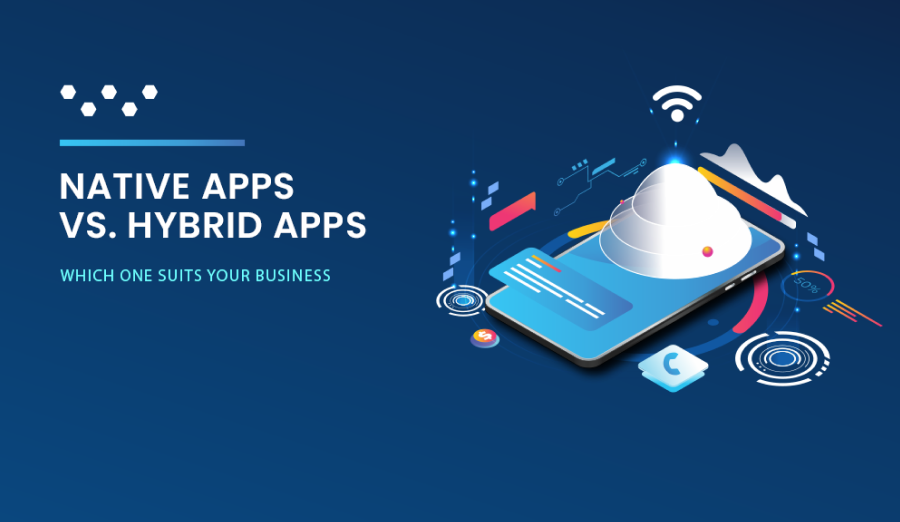Streamline Your Data Processes - Start a project!
Get customized solutions for your business - Try Our Services Today!
Streamline Your eCommerce Operations - Try Our Services Today!

Native Apps Vs. Hybrid Apps: Which One Suits Your Business
We live in a fast-paced world where mobile applications play an essential role in getting everything done. From ordering various products & services to engaging in different activities, people utilise mobile apps in every aspect of their daily activities. According to Statista, in 2021, Android users spent 92.5 per cent of their time engaging with mobile apps compared to the time spent interacting with mobile browsers. In another report published by Statista, in 2021, the App stores of Google and Apple generated revenue of around 47.9 billion U.S. dollars and 85 billion U.S. dollars through consumer spending.
Considering these stats, it is apparent that mobile applications hold great potential for business success. Enterprises are exploring new avenues to implement mobile application campaigns in the respective marketplaces as the number of mobile users continues to rise year after year.
It has become imperative for businesses to develop mobile apps to generate traffic and revenue and reap profits. However, the greatest challenge is determining which kind of mobile app to develop. Whether to develop a hybrid app or a native app and which one of these would be more effective for meeting the company objectives.
To help enterprises overcome these challenges, we have provided a brief overview of Native and Hybrid Applications.
Before we move further, a brief on Web Applications
In order to understand the difference between Native apps and Hybrid apps, one needs to clearly understand the purpose of web applications. These are internet-enabled applications accessed through the Web browser and do not require installation on a mobile device. Web apps are created as web pages using HTML and CSS, while the interactive features are developed in JQuery, JavaScript, or similar languages. These applications don’t depend upon the operating system and can work on any desktop, laptop, handheld, or mobile device which is capable of surfing the web. Now let’s move on to Native mobile applications.
What are Native Mobile Applications?
Native applications are developed to work on a targeted operating system like iOS, Android, or Windows. Hence, they offer the most responsive and rapid execution with high accuracy as per the target. The native apps are designed in a code primarily used for a particular Operating System.
Naturally, an application built to be operated on the iOS platform will not function on Android or Windows OS, and vice-versa. Thus, if you want to develop a native app for different OS platforms, your developers must create an OS-oriented codebase to develop the application.
Native applications are written in languages for the platform they are being built on. For instance, developers use Swift or more recent SwiftUI to develop native iOS applications. Java and Kotlin based development is done to build Native Android mobile applications and C# for Windows based native mobile applications. A few famous examples of native applications are Whatsapp and Spotify.
There are several Advantages of Native applications but not limited to the following:
-
First, native applications offer outstanding performance, faster response rates, and more efficiency than hybrid solutions due to their tight coupling between the hardware and the software layers.
-
Native apps can easily leverage device functionalities, such as utilising the mobile device’s camera, gestures, and other features from within the provided frameworks by the hardware designers like Apple, Google or Microsoft.
-
Native applications provide a more intuitive and interactive interface as compared to their hybrid counterparts, offering a splendid UI/UX experience.
Native applications do bring in some challenges, like the following:
-
Native apps involve a higher cost of development, design and maintenance. It requires specialised developers in their respective operating systems and more time to engineer apps for different platforms.
-
The native applications require specific attention & more time to maintain and update applications as native applications have multiple codebases compatible with the respective operating systems, which need to be addressed individually.
What are Hybrid applications?
We initially talked about web applications that are assessed through a web browser. Here, hybrid applications are a fusion of web apps and native apps. Hybrid apps contain the elements of both web apps and native apps where the application is developed using web technologies like HTML/CSS, which is wrapped into a native application or developed by utilising the latest frameworks such as Flutter or React Native. These applications act as native apps by communicating with the respective device platform and incorporating some operating system features running in the webview within the app. Hence, a hybrid app is a native application installed on your mobile device that works like a web app.
Therefore, Native & Hybrid applications might look similar. Still, the significant distinction can be found in their performance and behind-the-scenes where the development occurs. Moreover, when developing a hybrid app, developers don’t need to write separate codes for different platforms because, in hybrid apps, a single codebase is used to build and roll out applications for multiple operating systems. Thus, it provides the flexibility of reusing the code with few or no differences in the core functionality in different OS platforms.
A few major advantages of developing Hybrid Applications:
-
Compared to native apps, the expense of developing Hybrid apps is less. Maintaining and updating them is much simpler as it requires only one codebase to create multiple versions of one application.
-
Due to having only one codebase, hybrid apps can operate across multiple operating systems while delivering a user experience with a seamless user interface on all devices.
-
Hybrid apps offer users a near-native experience with consistent performance and broader market reach by targeting different platforms with one solution in less time.
Hybrid applications also have some shortcomings:
-
Hybrid apps provide limited user interface capabilities as they cannot exploit the unique features offered by operating systems and device hardware features.
-
Native mobile applications work marginally better than hybrid mobile applications when high-quality graphics, 3D/HD elements, and other functionalities requiring high performance are integrated into the mobile application.
-
Hybrid apps take a long time for developers to integrate new features released by Google and Apple into the application. As SDKs for hybrid applications take considerably more time to develop than native applications.
What works best for you?
Deciding what works best for you is more manageable than it seems. You have to consider the following factors to get the desired results.
-
What are your development resources and the timeline for the project?
-
What’s the target market audience?
-
What kind of functionalities that you wish to include in the application?
-
What are the native functionalities of devices you wish to use?
-
What kind of user experience do you wish to offer?
-
What options do you intend to provide users to access the application?
The answers to the above questions will assist you in deciding what kind of application will work best for you. Moreover, in-house testing and discussing every aspect of the application-building process with the developers and experts will help you shape your idea into a perfect application.
Nevertheless, whichever option you choose, don’t try to cut corners on the application quality you want to develop. In any case, select the option that best serves the end user. The ultimate goal of developing an application is for users to love using it and utilise its functionalities without hassle. You should, therefore, always keep your end users’ needs and preferences in mind when designing an application for your company and ensure that they are aligned with the desired goal of the application.
We're ready to walk you through the process if you want to develop an app or have an idea to create something remarkable. We at Syncrasy Tech excel at custom app development solutions for eCommerce, eLearning, Social apps, Web apps, and more. Talk to our consultants about your idea; they will answer your preliminary questions and guide you through the complete development process. Let’s get started - book a call today!
Categories
- Digital Asset Management (DAM)
- Artificial Intelligence (AI)
- Product Information Management (PIM)
- E-commerce
- Master Data Management (MDM)
- Digital Experience Management
- Customer Data Platform
- Data Management Platform
- Recruitment
- Covid-19
- Digital Workspace
- Digital Experience Portal (DXP)
- Omnichannel Experience
- Pimcore
- Framework Comparison
- Software Development
- Learning Management Solution (LMS)
- CRM System
- Sales Portal
- Salesforce
- Blockchain Development
- App Development
- Technology
Similar Blogs

PHP Laravel VS Symfony | Comparison of Web Development Frameworks
When PHP developers need to prepare any enterprise-grade web application, they often prefer to use a...
Read More
Native Apps Vs. Hybrid Apps: Which One Suits Your Business
We live in a fast-paced world where mobile applications play an essential role in getting everything...
Read More

